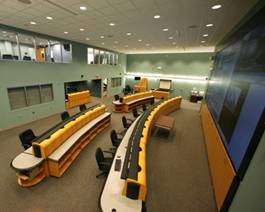Examination of Stress during Training
Menu Button: Examination of Stress during Training
Current Projects
ABC
The Stress & Motivated Behavior Institute is partnering with the Armament Research, Development and Engineering Center (ARDEC) at Picatinny Arsenal (Picatinny, NJ) to examine stress during training exercises. The ARDEC Basic Course (ABC) held at the Homeland Defense Technology Center (HDTC) is a week-long course directed by Warfighter Central branch of ARDEC that familiarizes Army civilian employees with the type of movements, pressure, and activities that the military experience in combat and noncombat situations. The overall concept of ABC is to have trainees endure a variety of training tactics from drill movements to land navigation so they gain a better understanding of the burdens and pressures placed on warfighters -- which in turn will lead to better engineering efforts.
Warfighter Central branch, in the interest of improving its training course and expanding its knowledge-based on training efficiency, the responses of trainees, and generalized knowledge on leadership, began a research program in cooperation with the SMBI in conjunction with the Target Behavioral Response Laboratory (TBRL). This initial experimental package was devised to inform Warfighter Central of program-specific and general knowledge regarding training, leadership, psychophysiology, performance of individuals and the efficacy of the ABC training to its stated goals. Importantly, these research efforts will support the educational outcomes of this ARDEC training. Furthermore, the SMBI’s integration of physiological and behavioral assessments into workforce training conducted by ARDEC has begun to form a database by which years of ABC training, and inherent changes in personnel and procedures, may be evaluated.
Residential Stress and Fatigue Facility (RSAFF)
The terror attacks of September 11, 2001 and the response to hurricane Katrina in 2005 demonstrated that large scale emergencies require the combined and coordinated efforts of a vast array of agencies and response units. Enormous demands are placed on situational awareness, command, information assessment and transmission, and logistics. Emergency systems must not only be quick to respond, but should be prepared for sustained integrative and cooperative operations. Decision-making is further complicated by inherent uncertainty, misinformation and the fluid nature of disasters, both manmade and acts of nature. Therefore, crisis preparation and management for natural disasters and acts of terror are not merely reducible to, or extensions of, preparation under calm controlled conditions — training must incorporate realistic stress and emulate the physical and emotional demands placed on individuals during large emergency response situations.
 The Army Research Development Engineering Center (ARDEC) has created a facility for training and research toward emergency responses to terrorism. ARDEC’s Technology Testbed Emergency Operations Center (Testbed EOC) serves as a developmental battle lab, providing Warfighters and first responders with interoperable, “world class” decision-support technologies to meet America's 21st century security and civil support challenges. Designed as a fully functional command and control center, the Testbed EOC also provides training, exercise, and real-world operational support to Warfighters, and civil support responders as well as local, state, and federal civil authorities. The Testbed EOC has several unique features and advantages over other training facilities: 1) scale; training can be accomplished in a permanent test bed with to-scale buildings, parks, airstrips, railroad cars, etc., 2) breadth; concurrent, integrative training of a number of agencies, and 3) science; involvement of government and academic scientists in all phases of training and evaluation.
The Army Research Development Engineering Center (ARDEC) has created a facility for training and research toward emergency responses to terrorism. ARDEC’s Technology Testbed Emergency Operations Center (Testbed EOC) serves as a developmental battle lab, providing Warfighters and first responders with interoperable, “world class” decision-support technologies to meet America's 21st century security and civil support challenges. Designed as a fully functional command and control center, the Testbed EOC also provides training, exercise, and real-world operational support to Warfighters, and civil support responders as well as local, state, and federal civil authorities. The Testbed EOC has several unique features and advantages over other training facilities: 1) scale; training can be accomplished in a permanent test bed with to-scale buildings, parks, airstrips, railroad cars, etc., 2) breadth; concurrent, integrative training of a number of agencies, and 3) science; involvement of government and academic scientists in all phases of training and evaluation.
The Residential Stress and Fatigue Facility (RSAFF) Program is a controlled assessment of stress, fatigue and performance at the Testbed EOC. In partnership with ARDEC, the SMBI has the ability to house research subjects for an extended period of time. Under these controlled conditions (tempature, lighting, sound, etc…), subjects can be instrumented for the chronic measures of physiological parameters (EEG, ECG, respiration, blood pressure, etc…). Assessment of performance and stress can be assessed over multiple days to stimulate the realistic duty cycles—20 hours work alternating 4 hours sleep—employed in actual emergency command scenarios. Stress is manipulated through task difficulty, workload, sleep deprivation, misinformation and failure of systems. In addition to performance, the SMBI gathers data to determine whether there are sets of individual differences that will aid the prediction of success/failure during emergency management.
